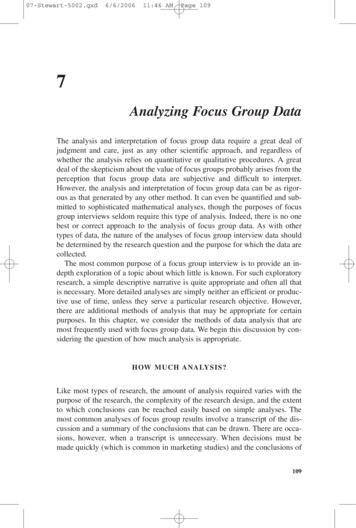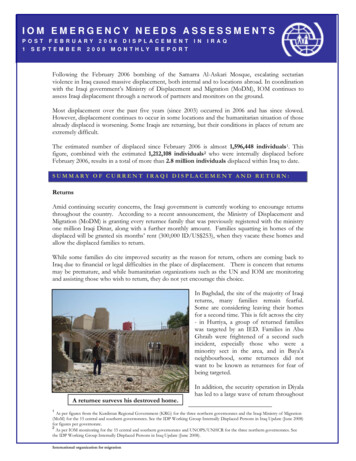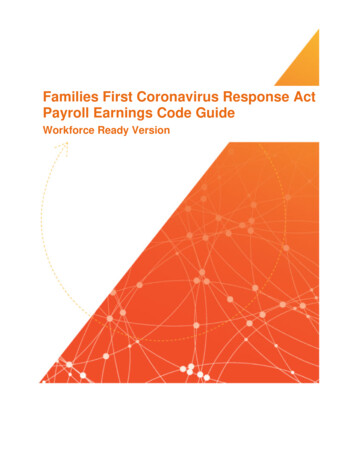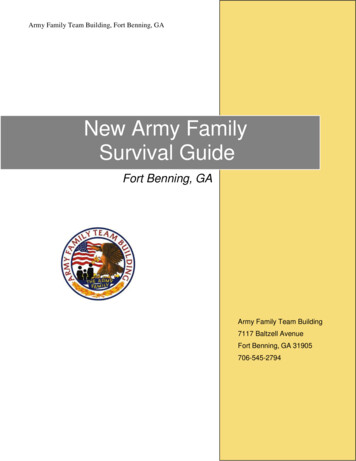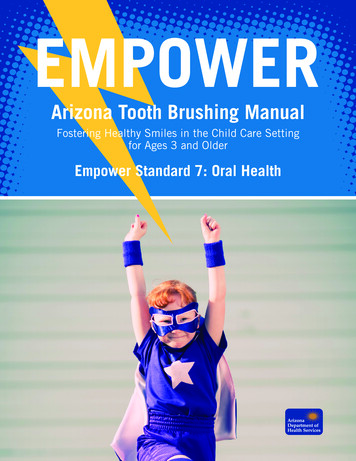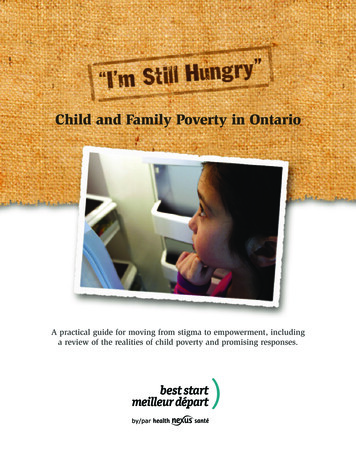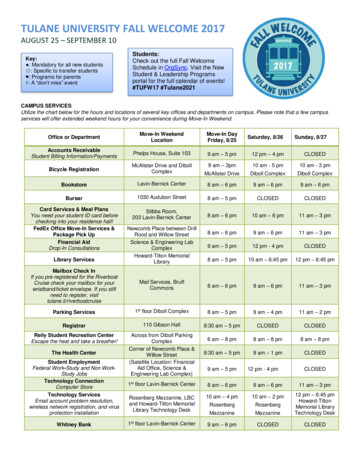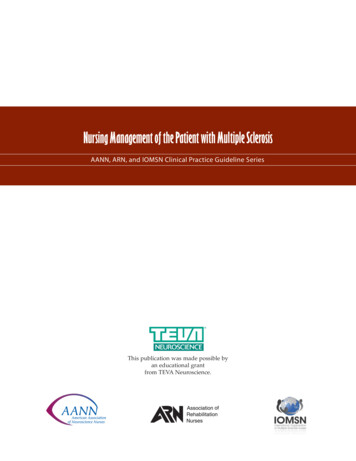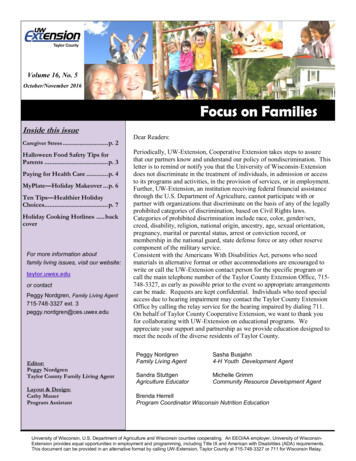
Transcription
Volume 16, No. 5October/November 2016Focus on FamiliesInside this issueCaregiver Stress . p. 2Halloween Food Safety Tips forParents . p. 3Paying for Health Care . p. 4MyPlate—Holiday Makeover . p. 6Ten Tips—Healthier HolidayChoices. p. 7Holiday Cooking Hotlines . backcoverFor more information aboutfamily living issues, visit our website:taylor.uwex.eduor contactPeggy Nordgren, Family Living Agent715-748-3327 ext. 3peggy.nordgren@ces.uwex.eduEditor:Peggy NordgrenTaylor County Family Living AgentLayout & Design:Cathy MauerProgram AssistantDear Readers:Periodically, UW-Extension, Cooperative Extension takes steps to assurethat our partners know and understand our policy of nondiscrimination. Thisletter is to remind or notify you that the University of Wisconsin-Extensiondoes not discriminate in the treatment of individuals, in admission or accessto its programs and activities, in the provision of services, or in employment.Further, UW-Extension, an institution receiving federal financial assistancethrough the U.S. Department of Agriculture, cannot participate with orpartner with organizations that discriminate on the basis of any of the legallyprohibited categories of discrimination, based on Civil Rights laws.Categories of prohibited discrimination include race, color, gender/sex,creed, disability, religion, national origin, ancestry, age, sexual orientation,pregnancy, marital or parental status, arrest or conviction record, ormembership in the national guard, state defense force or any other reservecomponent of the military service.Consistent with the Americans With Disabilities Act, persons who needmaterials in alternative format or other accommodations are encouraged towrite or call the UW-Extension contact person for the specific program orcall the main telephone number of the Taylor County Extension Office, 715748-3327, as early as possible prior to the event so appropriate arrangementscan be made. Requests are kept confidential. Individuals who need specialaccess due to hearing impairment may contact the Taylor County ExtensionOffice by calling the relay service for the hearing impaired by dialing 711.On behalf of Taylor County Cooperative Extension, we want to thank youfor collaborating with UW-Extension on educational programs. Weappreciate your support and partnership as we provide education designed tomeet the needs of the diverse residents of Taylor County.Peggy NordgrenFamily Living AgentSasha Busjahn4-H Youth Development AgentSandra StuttgenAgriculture EducatorMichelle GrimmCommunity Resource Development AgentBrenda HerrellProgram Coordinator Wisconsin Nutrition EducationUniversity of Wisconsin, U.S. Department of Agriculture and Wisconsin counties cooperating. An EEO/AA employer, University of WisconsinExtension provides equal opportunities in employment and programming, including Title IX and American with Disabilities (ADA) requirements.This document can be provided in an alternative format by calling UW-Extension, Taylor County at 715-748-3327 or 711 for Wisconsin Relay.
Multiple life roles may be source of caregiver stressYet informal caregiving may offer personal benefits to person providing careIt's no mystery that many informal caregivers—individuals explainswho provide unpaid support to family members or friends Litzelman. It isthe caregiverswith illness or disabilities—often feel stressed.with high levels“Informal caregivers’ responsibilities can cover a wideof stress whorange,” says Kristin Litzelman, a University of Wisconsin- are at risk forExtension specialist in family and financial well-beingburnout,during mid to later life. Litzelman says caregivers maydepression,provide emotional support and help with cleaning orextreme fatiguephysically moving around the house. Medical and health- and other healthcare tasks, such as coordinating medical appointments,problems.dealing with insurance, and sometimes even medicalprocedures that would once have taken place in a hospital, “Anothermay also be part of caregiving. Sometimes, care extends to important consideration is that caregiving stress alone isnot to blame for burnout and poor quality of life inproviding financial support.caregivers,” says Litzelman. “Stress from other areas ofOther life obligations don’t stop when caregiving begins,life, like paid employment, interpersonal relationships, orLitzelman says. Many caregivers have important roles and financial difficulties, can all accumulate and contribute toresponsibilities such as jobs, parenting or running aquality of life and mental health problems.”household. All of that can add up to an overwhelmingsituation, she says. If caregivers don't take care ofLitzelman says that how people feel about their stress—ifthemselves, they can burn out or develop their own health they see it as harmful, or as beneficial—can affect how itproblems.impacts them.Caregiving may not be the issueAt first glance, it might seem like caregiving is theproblem. “Research suggests, however, that it isn'tcaregiving itself that contributes to poor quality of life andother health problems in caregivers; rather, it is the stressthat can result from the multiple roles caregivers play,”says Litzelman.This distinction is important, says Litzelman, becauseinformal caregiving can actually have benefits for thecaregiver. Feeling good about themselves and having asense of purpose are two of the benefits caregivers report.“That sense of purpose and responsibility can contribute tobetter health and quality of life,” says Litzelman.“Caregiving itself is not a bad thing, and can actuallycontribute to positive emotional health for caregivers.”Attitude is importantEven if caregivers have a lot on their plate, it doesn’tautomatically mean they will feel stressed or overwhelmed.“An important piece of the puzzle is how caregiversperceive or appraise the situation. When they have theresources to deal with the challenges presented bycaregiving, it may not feel stressful,” says Litzelman.For caregivers who report low levels of stress, someresearch shows that they may actually have betteroutcomes than people who aren't informal caregivers,ranging from better quality of life to lower mortality risk,October/November 2016Resources availableAccording to Litzelman, the good news is that there aremany resources—respite care, educational classes, supportgroups, even financial assistance—for family caregivers.In Wisconsin, most family caregivers can get moreinformation about resources they are eligible for bycontacting their local Commission on Aging Office orADRC. Online resources like the Family Care Navigator,or in-person connections with hospital social workers, faithleaders, or others, can also point caregivers in the rightdirection.“Caregivers also benefit from taking time to take care ofthemselves,” says Litzelman. “Research tells us thatactivities like exercise, mindfulness and cultivating a senseof gratitude are all associated with better well-being infamily caregivers.”Feeling more in control of any area of life may also help;for example, financial coaching to get a handle onbalancing retirement saving and medical debt, ororganizing help to keep up with chores and housework.“Giving caregivers permission and encouragement to takecare of themselves can also help. Only by caring forourselves can any of us successfully care for others,” saysLitzelman.Focus on FamiliesTaylor County UW-Extension2
Halloween food safety tips for parentsEven though it’s not an official holiday, Halloween is much beloved bychildren and adults alike. What could be more fun than trick-or-treating,apple bobbing, or costume parties?To make sure treats are safe for children, follow these simple steps: Snacking: Childr en shouldn’t snack on tr eats fr om their goody bagswhile they’re out trick-or-treating. Give them a light meal or snack beforethey head out – don’t send them out on an empty stomach. Urge them towait until they get home and let you inspect their loot before they eat anyof it. Safe treats: Tell childr en not to accept – and especially not to eat –anything that isn’t commercially wrapped. Inspect commercially wrapped treats for signs of tampering, such as anunusual appearance or discoloration, tiny pinholes, or tears in wrappers. Throw away anything that looks suspicious. Food Allergies: If your child has a food aller gy, check the label to ensur e the aller gen isn’t pr esent. Do notallow the child to eat any home-baked goods he or she may have received. Choking hazards: If you have ver y young childr en, be sur e to r emove any choking hazar ds such as gum,peanuts, hard candies, or small toys.Bobbing for apples is an all-time favorite Halloween game. Here are a couple of ways to say “boo” to bacteria that cancause foodborne illness. Reduce the number of bacteria that might be present on apples and other raw fruits and vegetables by thoroughlyrinsing them under cool running water. As an added precaution, use a produce brush to remove surface dirt. Try this new spin on apple bobbing from FightBAC.org:Cut out lots of apples from red construction paper. On eachapple, write activities for kids, such as “do 5 jumpingjacks.” Place a paper clip on each apple and put them in a largebasket. Tie a magnet to a string. Let the children take turns“bobbing” with their magnet and doing the activity written ontheir apple. Give children a fresh apple for participating.If your idea of Halloween fun is a party at home, don’t forgetthese tips: Beware of spooky cider! Unpasteurized juice or cider cancontain harmful bacteria such as Salmonella. To stay safe,always serve pasteurized products at your parties. No matter how tempting, don't taste raw cookie dough orcake batter that contain uncooked eggs. “Scare" bacteria away by keeping all perishable foodschilled until serving time. These include finger sandwiches, cheese platters, fruit or tossed salads, cold pasta disheswith meat, poultry, or seafood, and cream pies or cakes with whipped-cream and cream-cheese frostings.Bacteria will creep up on you if you let foods sit out too long. Don’t leave perishable goodies out of the fridge for morethan two hours (1 hour in temperatures above 90 F).For more food safety information, visit http://foodsafety.wisc.edu or https://www.foodsafety.gov.October/November 2016Focus on FamiliesTaylor County UW-Extension3
October/November 2016Focus on FamiliesTaylor County UW-Extension4
October/November 2016Focus on FamiliesTaylor County UW-Extension5
October/November 2016Focus on FamiliesTaylor County UW-Extension6
October/November 2016Focus on FamiliesTaylor County UW-Extension7
Postage & Fees PaidNon-ProfitMedford WI 54451Permit No 196Taylor County UW-ExtensionCounty USDA Service Center925 Donald Street Room 103Medford WI 54451CURRENT RESIDENT ORIf you no longer want to receive this newsletter,please let us know—715-748-3327 ext. 9Holiday Food Questions?UW-Extension, Taylor CountyPeggy NordgrenFamily Living Agent715-748-3327Weekdays - 8:30 a.m. to 4:30 p.m.peggy.nordgren@ces.uwex.eduUSDA Meat & Poultry Hotline1-888-674-6854Email: l/fsis/topics (Look under “FactSheets” and “Seasonal Food Safety”)Butterball1-800-BUTTERBALL (1-800-288-8372 )10 a.m. to 7 p.m. CST with additional extended holiday hoursin November & Decemberwww.butterball.comEmail: talkline@butterball.comJennie-O TurkeyCustomer Service1-800-621-3505Mon - Fri 8 a.m. to 4 p.m. CSTExcludes mann's YeastBaker's Helpline1-800-777-4959www.breadworld.comLand O'LakesConsumer Affairs 1-800-328-4155Hours: Monday 9 a.m. - 3:30 p.m. CST,Hours: Tuesday - Friday 8 a.m. - 3:30 p.m. cean Spray Consumer Helpline1-800-662-326310:00 a.m. to 5:00 p.m. eanspray.com/Ocean-Spray-Recipes.aspxHoliday Food Safety days.htm“Issued in furtherance of Cooperative Extension work, Acts of May 8 and June 30, 1914, in cooperationwith the U.S. Department of Agriculture. Rick Klemme, Cooperative Extension, University of Wisconsin-Extension.”
If your idea of Halloween fun is a party at home, don’t forget these tips: Beware of spooky cider!Unpasteurized juice or cider can contain harmful bacteria such as Salmonella. To stay safe, always serve pasteurized products at your parties. No matter how tempting, don't taste ra
